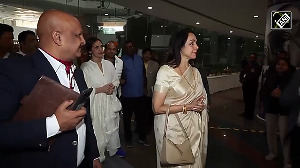The first exodus saw 250,000 Kashmiri Pandits leaving their homes in Kashmir valley for sanctuary in Jammu and Delhi.
Subsequent targeted killing of Pandits forced the remaining to also flee and take refuge in shanty camps; those who could afford it, moved into rented accommodation. The final number of Pandits reduced to living as refugees in their own country would be as high as 400,000.
When Kashmiri Pandits fled Islamic terror
According to official statistics, notorious for being inaccurate if they are provided by the apology of a state government in Jammu & Kashmir and unreliable if they emanate from the Union home ministry, some 250,000 Kashmiri Pandits continue to camp in Jammu; another 100,000 are in Delhi. A large number of families have moved to other cities, some have migrated to the US or European countries.
Those who live in refugee camps -- some 4,600 families -- have to make do with one-room tenements. So, we have thousands of families who for 15 years have been condemned to live in 10 by 12 feet rooms, one room for each family. Prime Minister Manmohan Singh, following his visit to a camp last year, has sanctioned funds for two-room tenements.
Then there are those Pandit families that do not have the wherewithal to live in rented accommodation, having left behind all their assets in the 'Muslim only' Kashmir valley, and have not been able to secure a one-room tenement. They live in tattered tents.
Every time the issue of the plight of the Kashmiri Pandits has been raised, the Union and state governments have been quick to point out the 'assistance' provided to the 'migrants.'
The assistance is all of Rs 600 per head up to a maximum of Rs 2,400 per family. And inedible, PDS surplus food grains, what the Union home ministry's annual report eloquently describes as 'dry ration @ 9 kgs of rice and 2 kgs of atta per person and one kg of sugar per family per month to needy migrants.'
This did not happen in my Kashmir
The 'non-needy migrants' are Kashmiri Pandits who were government employees. They continue to receive their salaries or pensions. But they have been deprived of benefits like promotion. Most of them are barely able to keep body and soul together.
Kashmiri Pandit children have suffered the most. According to state government officials, '10 primary schools and three high schools have been built for migrant children.' Who is to tell them that 10 primary schools and three high schools cannot meet the needs of 250,000 people?
Will the Pandits ever find a home?
As for health care, the Kashmiri Pandits have been left to fend for themselves. Officials claim there are 28 doctors in the camps. Show us the doctors, say the Pandits. Local residents of Jammu are entitled to free medicines and health care in government dispensaries and hospitals, but not the 'migrants' who must pay.
Meanwhile, depression and other stress-related health problems plague the exiled community. Studies have shown that Kashmiri Pandits have begun to age rapidly, much earlier than before. Fertility rate among them has registered a sharp decline while mortality rate has increased.
The humiliation of living on dole apart, there is this added slight of being labelled 'migrants' -- as if the Kashmiri Pandits migrated of their own volition from the land of their forefathers. Implicit in this labelling is the shameful failure of India's political class and its self-serving bureaucracy to recognise the truth behind the violence in Jammu & Kashmir.
Union Home Minister Shivraj Patil has the gumption to tell Parliament 'they (terrorists in Jammu & Kashmir) are our brothers and sisters.' Therefore, the Government of India must embrace them.
What, then, are the Kashmiri Pandits chased out of their home and hearth by Mr Patil's 'brothers and sisters'?
The current dispensation in Delhi, however, is only echoing the callous indifference towards the plight of Kashmiri Pandits that has been the official policy of at least five different Union governments in these 15 years of their forced exile.
Kashmir is not okay, Mr Sayeed
Prime Minister Manmohan Singh has recently set up an inter-ministerial group to prepare a report on the welfare of the Kashmiri Pandits. But that is small consolation for the thousands of hapless men, women and children who are convinced that nothing ever will be done to restore their lost lives.
Chief Minister Mufti Mohammed Sayeed has on and off talked about enabling the Kashmiri Pandits to return to the valley. Three residential colonies are being set up for those willing to return. But Kashmiri Pandits believe this is an elaborate and devious political ploy meant to fool the Union government. Bearing in mind the Mufti's track record, they have a point.
Interview: Panun Kashmir leader Kamal Hak
In any event, it makes little sense for the Kashmiri Pandits to live in ghettos: they will be sitting ducks during a terrorist strike. Moreover, the self-appointed spokesmen of the 'Muslim only' Kashmir valley have shown little interest in the return of the Kashmiri Pandits. Pro-Pakistani secessionists like Syed Ali Shah Geelani have openly opposed any talk of the Kashmiri Pandits returning to their own land.
'Where do we return to?' is a common refrain among the exiles. Their homes, which they had left behind, have been forcibly occupied. The ownership of their agricultural land has been surreptitiously transferred. Their shops and businesses have been either destroyed or illegally taken over. Government measures meant to protect Kashmiri Pandit property have been followed more in the breach than in practice. Politicians and officials have been complicit partners in this robbery.
In the months after the exodus of 1990, most Kashmiri Pandits were hopeful that they would soon be able to return to their homes with full dignity and honour. The months stretched into years. The years have stretched into a decade-and-a-half of exile whose end is nowhere in sight.
Today, they live on dole and in despair, not on hope.





